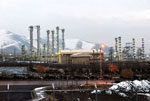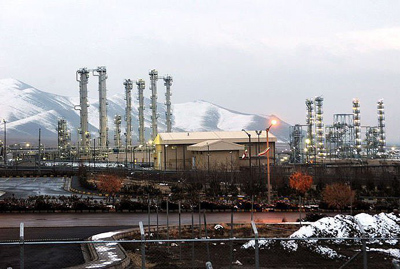 Reuters: Russian and Chinese reluctance may complicate any Western campaign to parlay a U.N. watchdog report this month into political momentum for tougher sanctions on Iran over its disputed nuclear programme, diplomats and analysts say.
Reuters: Russian and Chinese reluctance may complicate any Western campaign to parlay a U.N. watchdog report this month into political momentum for tougher sanctions on Iran over its disputed nuclear programme, diplomats and analysts say.
By Fredrik Dahl
 VIENNA (Reuters) – Russian and Chinese reluctance may complicate any Western campaign to parlay a U.N. watchdog report this month into political momentum for tougher sanctions on Iran over its disputed nuclear programme, diplomats and analysts say.
VIENNA (Reuters) – Russian and Chinese reluctance may complicate any Western campaign to parlay a U.N. watchdog report this month into political momentum for tougher sanctions on Iran over its disputed nuclear programme, diplomats and analysts say.
The report by the International Atomic Energy Agency (IAEA), due next week, has exposed divisions among world powers on how to best handle the long-running row over Iranian nuclear activities the West fears are aimed at developing atom bombs.
The IAEA document is expected to bare detailed intelligence pointing to military dimensions to Iran’s nuclear programme but stop short of saying explicitly that Tehran is trying to build such weapons.
Its content may increase tension at a sensitive time: Israel test-fired a missile on Wednesday amid a heightened public debate in the Jewish state over the possibility of a pre-emptive Israeli attack on arch-foe Iran’s nuclear sites.
Western envoys believe the U.N. agency’s findings — which they describe as incriminating for Iran — will help turn up the heat on the Islamic Republic to curb its sensitive nuclear work and finally address international concerns about its aims.
In contrast, Moscow and Beijing have signalled concern that the report will box Iran into a corner and dim any chance of diplomacy resolving the dispute, which has the potential to spark a wider conflict in the Middle East.
“The Russians in particular have been lobbying quite intensively,” one senior Western diplomat said.
IAEA Director General Yukiya Amano will still go ahead and submit his report to member states ahead of a Nov. 17-18 meeting of the agency’s 35-nation governing board, diplomats said.
But Western countries may face an uphill struggle to win Russian and Chinese support for strong follow-up action, especially for any board resolution that would report Iran once again to the U.N. Security Council, as happened in 2006.
“Without China and Russia agreeing, a non-compliance resolution on Iran would be stillborn,” said nuclear expert Mark Hibbs of the Carnegie Endowment for International Peace.
The IAEA is tasked with preventing the spread of nuclear weapons and member states are obliged to cooperate transparently with the agency, which says Iran has failed to answer questions about the nature of its atomic work for the past three years.
Iran has repeatedly rejected Western allegations of military-linked nuclear activity as forged and baseless.
WESTERN SANCTIONS DRIVE
Peter Crail, a Washington-based analyst, said Russia did not appear to be objecting to what he called the evidence about Iran’s activities but the prospect of making it public.
“It seems Moscow realises that an IAEA report detailing Iran’s warhead development would require a response from the (IAEA) board,” said Crail, of the Arms Control Association, a research and advocacy group.
The United States and its allies have gradually increased sanctions pressure on Iran over a uranium enrichment programme they suspect is geared to yielding bombs. Iran says it needs to refine uranium for a planned network of nuclear power plants.
Russia and China — which together with the United States, France, Germany and Britain make up the six world powers involved in nuclear diplomacy with Tehran — have backed four rounds of U.N. sanctions on Iran since 2006.
But they criticised the United States and the European Union last year for taking extra unilateral steps against Iran and Moscow has made clear its opposition to any new U.N. Security Council measures against Tehran.
Both countries have commercial and other links with Iran, one of the world’s largest oil producers. China is a major importer of Iranian crude, even though Beijing has put the brakes on oil and gas investment in the country.
The United States is now seeking European support for more sanctions on Iran, both as part of efforts to deter Tehran from pursuing nuclear capabilities and in response to an alleged plot to kill the Saudi ambassador to Washington.
The IAEA board makes decisions by simple majority but both China and Russia could veto any subsequent Security Council action.
“It would be preferable to have another Security Council (sanctions) resolution. But I don’t have the feeling that the Chinese and Russians are prepared for that,” said Oliver Thraenert, a senior fellow of the German Institute for International and Security Affairs.
As an alternative to directly reporting Iran to the Security Council, Western diplomats said they were considering an IAEA resolution that would give Iran until the next board meeting in early 2012 to address questions raised by the agency’s report.
“Were Iran not to comply with that deadline it would then be harder for China and Russia to justify further inaction by the IAEA and the board,” Hibbs said.
But the senior diplomat, from none of the four major Western powers, suggested the best outcome that could be hoped for was Russian and Chinese abstentions in any IAEA board vote on Iran.
“The big question is whether the Russians or the Chinese would abstain or vote against,” the envoy said. “My supposition is that the resolution will be voted on, it will be carried very narrowly and there could be quite a lot of abstentions.”
BIG POWER SPLITS
Since negotiations between the powers and Iran foundered in January, Russia has advocated a phased plan in which Tehran would address concerns that it may be seeking nuclear weapons, and be rewarded with an easing of sanctions.
Western diplomats have reacted coolly to Russia’s proposal.
Iran has said it is willing to resume discussions. But its insistence that other countries recognise its right to enrich uranium is a major stumbling block, particularly for Western diplomats who see it as an unacceptable precondition.
Israel and the United States have not ruled out military action if diplomacy fails to resolve the nuclear dispute.
Many experts believe Iran is still a few years away from being able to build nuclear weapons if it decided to do so, potentially giving diplomacy more time.
(Editing by Mark Heinrich)


